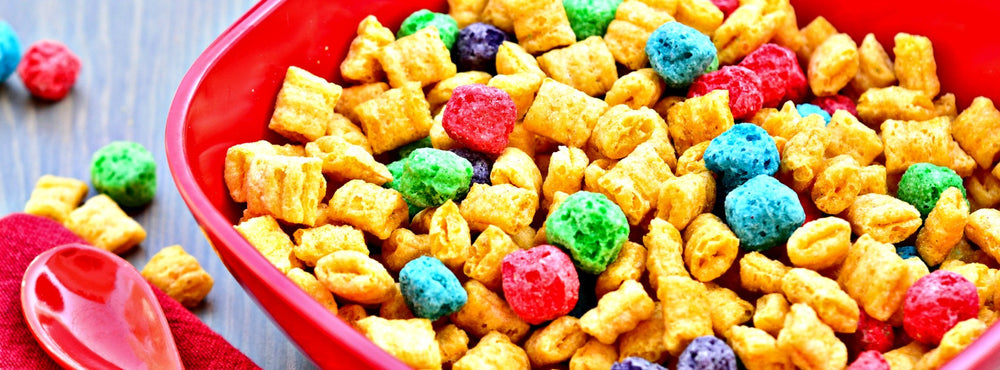These 10 low-fat foods are REALLY bad for you

Many people associate the term “low fat” on a package label with heart health, but the claim is no guarantee.
Fruits and vegetables are naturally low in fat, and they are good for you. But so are low fat cookies, and those are definitely not a nutritious choice.
Foods labeled “low fat” first hit the grocery shelves in the mid-1980s. They were developed primarily in response to rising obesity rates and a directive from the federal government that Americans should consume less fat.
But what happened when food manufacturers removed the fat? They started adding sugar. Back in the 1970s and ’80s, many food scientists believed that dietary fat caused weight gain, and that carbohydrates from sugar could be consumed in virtually unlimited quantities without consequence.
Today we know that added sugar is anything but healthy and is linked to an increased risk of obesity, heart disease, kidney disease, and type 2 diabetes. But the myth that low fat/high sugar foods are good for us has survived all these years later.
Here’s a list of 10 low-fat foods that you should absolutely avoid, and our suggestions for some healthy alternatives.
1. Low-Fat Sweetened Breakfast Cereals
Breakfast cereals are a fast way to start your day. And many of us believe they are a healthy choice, especially if they are low in fat, contain some whole grains and are fortified with vitamins and minerals.
What's bad about it: Most cereals are loaded with sugar, averaging nearly 25% by weight. Granolas are some of the worst offenders. A half-cup servings weighs in at 49 grams and can contain 14 grams of added sugar. Instant oatmeal with appetizing names like Maple Syrup or Brown Sugar usually contain lots of added sugars, artificial flavors and colorings.
We recommend: Plain Quaker® Oats or Bob’s Red Mill® Steel Cut Oats with fresh fruit. Better yet, choose Step One Foods Blueberry & Cinnamon Oatmeal.
2. Low-Fat Flavored Coffee Drinks
Black coffee is one of the healthiest beverages you can drink because it contains antioxidants that protect your heart and reduce the risk of type 2 diabetes.
What's bad about it: The benefits from coffee are wiped out by the addition of flavored syrups, many of which are high in added sugar. A 16 oz. nonfat mocha drink can contain a whopping 33 grams of sugar. That’s 57% of the drink’s total calories.
We recommend: Black coffee, black or green tea, or water. If you're in the mood for something sweet, try a Step One Strawberry Banana Smoothie.
3. Low-Fat Flavored Yogurt
Yogurt has a long-standing reputation as a healthy food, and studies have indeed show that plain yogurt may help with weight loss and improve body composition.
What's bad about it: Low-fat, sugar-sweetened yogurt contains too much sugar to qualify as a nutritious choice. In fact, many contain as much sugar as a serving of dessert. For example, 8 ounces of fruit-flavored, nonfat yogurt contains 47 grams of sugar, which is nearly 12 teaspoons. In comparison, an equivalent serving of chocolate pudding has 38 grams of sugar.
We recommend: Choose Fage® plain yogurt, add fresh fruit and Step One Foods Anytime Sprinkle.
4. Low-Fat Salad Dressing
Salad dressing enhances the flavor of raw vegetables and may improve a salad’s nutritional value. Traditional salad dressings are high in fat, which helps your body absorb the fat-soluble vitamins A, D, E and K. Fat can also help you absorb antioxidants from foods such as leafy greens, carrots and tomatoes.
What's bad about it: Low-fat and fat-free salad dressings don’t contribute any health benefits to your meal. Most also contain lots of sugar and preservatives. Even “less sweet” dressings such as “Fat Free Italian” are loaded with sugar.
We recommend: The healthiest choice here is plain olive oil and vinegar with a dash of Dijon mustard. Lemon olive oil and infused vinegars add a whole new flavor dimension to your salads and vegetables.
5. Reduced-Fat Peanut Butter
Studies suggest that peanuts may help with appetite control, body weight, blood sugar and heart health, likely because of the high monounsaturated fat content.
What's bad about it: Reduced fat peanut butter contains sugar and high-fructose corn syrup. Healthy monounsaturated fats have been replaced by hydrogenated/partially-hydrogenated vegetable oil. And check out the calories; natural peanut butter and reduced-fat peanut butter both come in at 190 calories in a 2 tablespoon serving.
We recommend: Natural peanut butter.
6. Low-Fat Muffins
We all know that baked goods should be an occasional treat, but low-fat muffins may seem like a healthier option.
What's bad about it: A small (71-gram) low-fat blueberry muffin contains 19 grams of sugar. This is 42% of the calorie content. Be aware, this is a much smaller muffin than you’d find in a coffee shop or convenience store. The average commercial muffin is 300% larger than that, meaning you’re eating three servings, not one. Low-fat muffins contain little fiber and often have a high glycemic index (GI). High-GI foods raise blood sugar quickly, which may increase the hunger that drives overeating and leads to weight gain, as well as contributing to elevated cholesterol readings and inflammation.
We recommend: Bakery items should only be consumed occasionally and in reasonable amounts. Bake them yourself, or buy them from your local bakery. At all costs, avoid the mass produced variety you’ll find at the gas station or convenience store.
7. Low-Fat Frozen Yogurt
Low-fat or nonfat frozen yogurt is promoted as a healthier choice than ice cream.
What's bad about it: They both contain just as much sugar as ice cream. In addition, portion sizes for frozen yogurt are typically much larger than those for ice cream.
We recommend: Eat the ice cream and make it a rare indulgence.
8. Low-Fat Cookies
Like other muffins and ice cream, cookies should be an occasional treat.
What's bad about it: Low-fat cookies aren’t any healthier than other cookies. They are also less satisfying which means you are likely to eat more. Like most low-fat foods, the sugar content of these cookies is high. A fat-free oatmeal raisin cookie has 15 grams of sugar, which is 55% of its total calorie content.
We recommend: Bakery items should only be consumed occasionally and in reasonable amounts. Bake cookies yourself, or from buy them from your local bakery. At all costs, avoid the mass produced variety.
9. Low-Fat Cereal Bars
Nutrition bars are all the rage and marketed as a healthy on-the-go breakfast for busy people.
What's bad about it: In reality, they’re loaded with added sugar and contain few nutrients that don’t come from vitamin and mineral fortifications. One popular low-fat, strawberry-flavored cereal bar contains 13 grams of sugar, only 1 gram of fiber and 2 grams of protein.
We recommend: Step One Foods Dark Chocolate Crunch.
Nothing else comes close to the nutrition you’ll find in our bars.
10. Low-Fat Sandwich Spreads
No one wants to choke down a dry sandwich, so low-fat spreads seem like a fantastic way to add flavor without the fat.
What's bad about it: Low-fat spreads such as margarine are a bad choice. Even though they have less fat than butter, they often contain trans fats. Look for “hydrogenated” and “partially hydrogenated” fats in the ingredient list. These have been linked to inflammation, heart disease and obesity and should be avoided at all costs.
We recommend: Use a modest amount of butter or regular mayo. Better yet use hummus or avocado.
Try Step One Foods today!
Each non-pharmaceutical dose of Step One Foods targets the root cause of high cholesterol for proven reduction without major lifestyle changes. Choose Step One Foods twice each day as a meal or snack for lower cholesterol in as little as 30 days.

Tested & Proven Results.
- Cardiologist formulated
- Supported by over 500 publications
- Clinically-proven, in a double-blind randomized trial with Mayo Clinic and The University of Manitoba
80% of participants lowered their cholesterol in just 30 days. With just two servings per day, Step One Foods offers a proven-effective way to naturally lower LDL (bad) cholesterol.
Get heart health tips and articles like this, delivered right to your email.
New articles every week.
You may also like...

The Most Misunderstood Heart Number (Plus Your Tune-Up Checklist)

You don’t need to avoid foods with cholesterol…except for these



